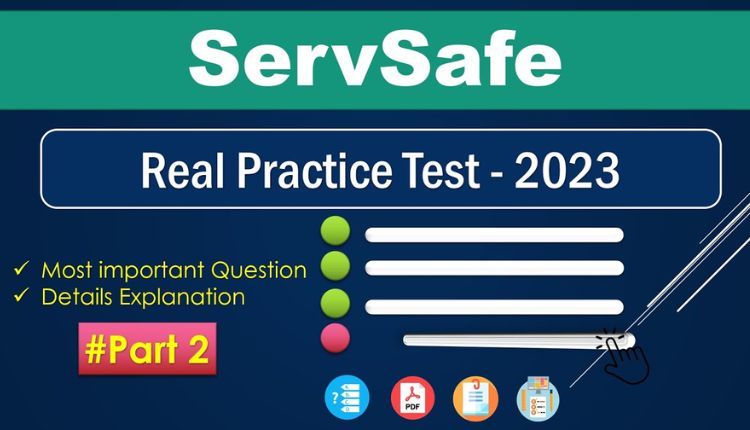Ensuring the correct handling of food is crucial not only for the health of customers but also for maintaining a reputable business. ServSafe is a recognized certification program that plays a vital role in teaching food handlers about food safety best practices. From small cafes to large restaurants, Serv Safe certification has become the standard for those who want to maintain high hygiene standards and protect their customers.
History and development of Serv Safe
Serv Safe was developed by the National Restaurant Association to respond to the growing need for proper food safety training in the United States. The programme was designed to provide educational resources and certifications for food handlers, managers, and other industry professionals.
Over the years, ServSafe has expanded its curriculum to include not only basic food safety but also topics such as allergen awareness, hygiene practices, and kitchen crisis management. The credibility of the programme has grown, making it a benchmark in the food service industry.
Components of Serv Safe certification
The Serv Safe certification consists of several courses and exams tailored to different roles in the food service industry. The main components include certification of food processors, certification of managers, and certification of alcohol services.
A food handling course focuses on everyday food preparation procedures, including proper hand washing, food storage and temperature control. Managerial certification is more comprehensive and includes regulatory standards, foodborne illness prevention and oversight responsibilities. The alcohol service course deals with the safe and legal serving of alcoholic beverages, emphasising customer safety and legal compliance.
The importance of Serv Safe in the prevention of foodborne illness
Foodborne diseases remain a significant problem worldwide, leading to serious health complications and, in some cases, even death. Serv Safe education provides food service workers with the knowledge to identify potential hazards such as cross-contamination, improper cooking temperatures, and poor sanitation practices.
By implementing ServSafe guidelines, businesses can drastically reduce the risk of foodborne illness outbreaks and protect both customers and employees. Certification also demonstrates a commitment to public health and strengthens the company’s reputation and customers’ trust.
Compliance with regulations and industry standards
Many states and local jurisdictions in the United States require Serv Safe certification for restaurant managers and key food handlers. The program complies with the Food and Drug Administration (FDA) Food Code and ensures that certified professionals meet national safety standards.
Compliance with these regulations not only reduces legal risks for businesses but also streamlines controls and improves operational efficiency. By adhering to ServSafe standards, restaurants and other food service establishments maintain consistency in food handling practices, which is critical to maintaining quality and safety.
Benefits for employees and employers
Serv Safe certification brings benefits to both employees and employers. For employees, it provides a formal credential that can improve career prospects, improve job performance and increase awareness of food safety practices.
Certified staff for employers ensures smooth kitchen operations, reduces liability and promotes a culture of safety. It also serves as a marketing advantage, as many customers prefer establishments that prioritize food safety and have certified staff. Additionally, certified managers are better equipped to train employees, conduct regular safety audits, and resolve problems before they escalate.
ServSafe Training Methods
Serv Safe certification training can be completed through classroom sessions, online courses, or a combination of both. The courses use a combination of learning materials, interactive activities, and practice exams to prepare participants for the certification exam.
Online courses are increasingly popular due to their flexibility and affordability, allowing employees to complete training at their own pace. On the other hand, classroom sessions provide hands-on experience and direct interaction with instructors, which can improve understanding and retention of critical concepts.
Serv Safe Test and certification process
After completing the training, participants must pass the ServSafe exam to become certified. The exams are designed to test knowledge of food safety principles, hazard identification, and proper handling techniques.
The level of difficulty varies by course, with the executive certification exams being more complex. After certification, the credential is valid for a period of time, after which recertification is required to ensure knowledge remains current. The certification process emphasizes accountability and ongoing education, which is essential in an industry where standards and regulations are often evolving.
The global impact of ServSafe
Although Serv Safe originated in the United States, its influence has spread internationally. Many countries now recognise ServSafe certification as a benchmark for food safety education. International restaurants, hotels, and catering services use ServSafe training to ensure consistent procedures and compliance with global safety standards. This worldwide acceptance reflects the universal importance of food safety and the program’s effectiveness in promoting safe food handling practices.
The Bottom Lines
ServSafe certification is more than just a credential; it is an important part of modern catering operations.
Frequently asked questions
What is ServSafe certification?
Serv Safe certification is a program developed by the National Restaurant Association that educates food service workers about safe food handling, hygiene, and compliance.
Who needs ServSafe certification?
Food handlers, restaurant managers, and anyone involved in the preparation or service of food and beverages may need ServSafe certification, depending on local regulations.
How long is the ServSafe certification valid?
ServSafe certification is typically valid for three to five years, depending on the specific course, after which recertification is required.





